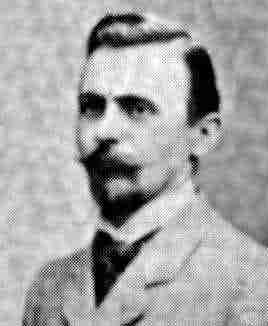


 تاريخ الرياضيات
تاريخ الرياضيات
 الرياضيات في الحضارات المختلفة
الرياضيات في الحضارات المختلفة 
 الرياضيات المتقطعة
الرياضيات المتقطعة
 الجبر
الجبر
 الهندسة
الهندسة 
 المعادلات التفاضلية و التكاملية
المعادلات التفاضلية و التكاملية 
 التحليل
التحليل
 علماء الرياضيات
علماء الرياضيات |
Read More
Date: 1-5-2017
Date: 3-5-2017
Date: 3-5-2017
|
Died: 10 August 1929 in Pornichet, France

Pierre Fatou entered the École Normanle Supérieure in Paris in 1898 to study mathematics. He graduated in 1901 and then decided that the chance of obtaining a mathematics post was so low that he would apply for a position in the Paris Observatory.
Having been appointed to the astronomy post, Fatou continued to work on mathematics for his thesis. He submitted his thesis in 1906 which was on integration theory and complex function theory. Fatou proved that if a function is Lebesgue integrable, then radial limits for the corresponding Poisson integral exist almost everywhere. This result led to generalisations by Privalov, Plessner and Marcel Riesz. Although not giving a complete solution, Fatou's work also made a major contribution to finding a solution to the related question of whether conformal mapping of Jordan regions onto the open disc can be extended continuously to the boundary. In 1907 Fatou received his doctorate for this important work.
The book [2] presents a beautiful historical account of the global theory of iteration of complex analytic functions. Fatou enters this history in a rather complicated way and the book does an excellent job in explaining an interesting episode in the history of mathematics.
In 1915, the Académie des Sciences in Paris gave the topic for its 1918 Grand Prix. The prize would be awarded for a study of iteration from a global point of view. The author of [2] suggests that mathematicians such as Appell, Émile Picard, and Koenigs had put forward the idea to the Académie des Sciences because they were hoping for developments of Montel's concept of normal families. Fatou wrote a long memoirs which did indeed use Montel's idea of normal families to develop the fundamental theory of iteration in 1917. Although we do not know for certain that he was intending to enter for the Grand Prix, it seems almost certain that he undertook the work with that in mind.
Given that the topic had been proposed for the prize, it is not surprising that another mathematician would also work on the topic, and indeed Julia also produced a long memoir developing the theory in a similar way to Fatou. The two, however, chose different ways to go forward. During the later half of 1917 Julia deposited his results in sealed envelopes with the Académie des Sciences. Fatou, on the other hand, published an announcement of his results in a note in the December 1917 part of Comptes Rendus. It later became evident that they had discovered very similar results.
Julia wrote a letter to Comptes Rendus concerning priority which was published on 31 December 1917. Julia had asked the Académie des Sciences to inspect his sealed envelopes and Georges Humbert had been asked to carry out the task. In the same 31 December 1917 part of Comptes Rendus Georges Humbert has a letter reporting on Julia's papers. Almost certainly as a result of these letters Fatou did not enter for the Grand Prix and it was awarded to Julia. Fatou did not lose out completely, however, and even though he had not entered for the prize, the Académie des Sciences gave him an award for his outstanding paper on the topic.
Fatou was given the title of "astronomer" in 1928 and, as an astronomer, he also made contributions to that topic. Using existance theorems for the solutions to differential equations, Fatou was able to prove rigorously certian results on planetary orbits which Gauss had suggested by only verified with an intuitive argument. He also studied the motion of a planet in a resistant medium with the intention of explaining how twin stars would form with the capture of one moving in the atmosphere of the other.
We have mentioned some of his important mathematical work above. We should also mention his work on Taylor series where he examined the convergence and the analytic extension of the series. Perhaps Fatou's most famous result is that a harmonic function u > 0 in a ball has a nontangential limit almost everywhere on the boundary.
Books:
Articles:



|
|
|
|
دراسة تحدد أفضل 4 وجبات صحية.. وأخطرها
|
|
|
|
|
|
|
قسم الشؤون الفكرية يصدر كتاب الفلسفة الغربية برؤية الشيخ مرتضى مطهري
|
|
|